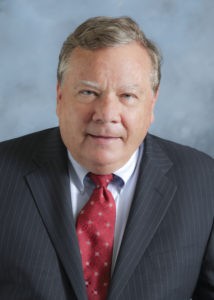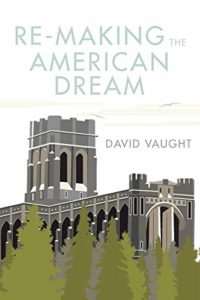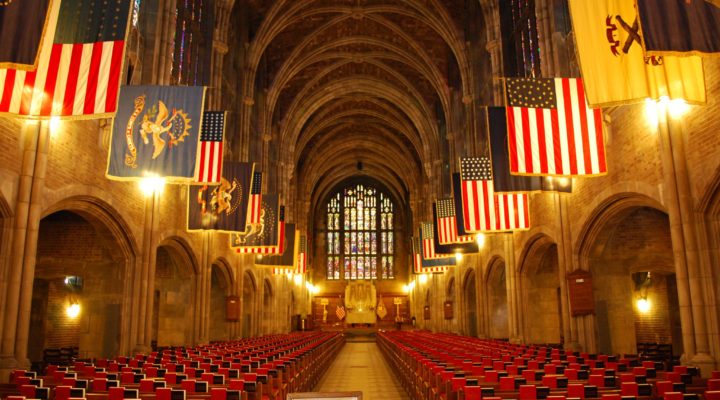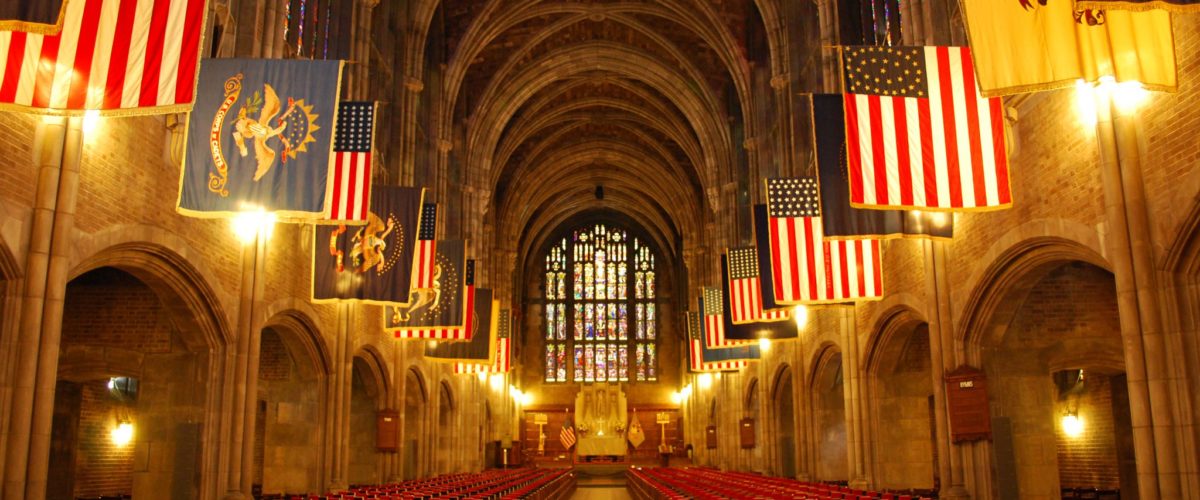David Vaught went to the U.S. Military Academy in 1965, war raging at home and abroad, to defend the Constitution.

David Vaught
Fueling his patriotism was a deep-seated Baptist faith imbued with a passion for the First Amendment. But those values led him to conflict with West Point, the Pentagon and even Alexander Haig.
 In his new book, Re-Making the American Dream, Vaught recounts how he and three other cadets took on the military in 1968 in a push to end mandatory chapel attendance for students at the academy.
In his new book, Re-Making the American Dream, Vaught recounts how he and three other cadets took on the military in 1968 in a push to end mandatory chapel attendance for students at the academy.
It was not an effort to avoid Vietnam, he said. “We were ready to fight the communists.”
Nor was it an attack on religion. “I had asked to go be able to go to the Baptist church in the adjoining town on Sunday mornings,” he explained.
When they began their effort, it was to do what they had been sworn to do as cadets: protect the Constitution.
“We wanted them to commit in writing to go along with our proposal or at least consider making some adjustments,” Vaught explained.
His inspiration and courage emanated from the strong Baptist faith of his Baptist father, a deacon and World War II veteran, and his grandmother, who fiercely supported the separation of church and state. Both launched him on a lifelong spiritual journey.
“I’ve been a Baptist my whole life,” he said.
While the four cadets’ effort did not have the desired result, the practice of mandatory chapel attendance was halted at all service academies with a federal appeals court ruling in 1972 — in which Vaught had been called to testify, to the detriment of his Army career.
“I had committed the ultimate sin: I testified in a federal case,” he said.
Vaught spoke with Baptist News Global about his book, his experience at West Point and about how his faith got him through it all.
To start, where were you born and raised?
Burnt Prairie. It’s a little farm town of less than 100 in southeastern Illinois — almost in Kentucky, almost in Indiana. My grandmother was one of the founders of the Liberty Baptist Church. Burnt Prairie originally was called Liberty. Prairie fires changed that.
What was it about your father that impressed you on freedom of religion?
There are a lot of things. It came from him and his mother, as well. He was a veteran, and she actually owned the farm and my father farmed it.
One thing I remember about my father was the time the church was looking for a new pastor and they hired one who had sold furniture for a living. He said he wanted to continue selling furniture and to work part-time for the church. So, they agreed to that and he sold furniture to everybody, including my father. But it never showed up. When they went to talk to him, he said: “I spent the money on my family. I didn’t send the money to the factory. I have to ask for forgiveness.” And they let him do that. It was a typically Baptist reaction of forgiveness. It told me a lot about what kind of deacon my father was and what kind of church it was.
My grandmother got very upset about the 1960 election with a Catholic running for president. She was a Democrat, so she wasn’t going to vote for (Richard) Nixon. She was worried the pope would control JFK. But when JFK went down to Texas and gave that speech saying he wasn’t controlled by the pope, she came around. So, I heard a lot from her going into every election about the importance of religious freedom and that there should be a lack of entanglement between church and government, and that government establishment of religion really didn’t belong in our country.
How long were you at West Point when you decided to act on the chapel service issue?
Three years. If you’re at West Point, you follow orders. You do what they tell you to do. Every Sunday morning you formed up and your marched by platoon and up to the chapel and into the chapel. I didn’t find it very satisfying. I did joint the Baptist Student Union that met some mornings for a devotional at West Point, although we didn’t have a lot of time for that.
“It occurred to four of us that we had taken an oath to support and defend the Constitution, yet attendance of the cadet chapel was mandatory.”
When you go into your final year at West Point, you actually play a leadership role in the Corps of Cadets. They said that part of running the corps is fixing things, making things right. It occurred to four of us that we had taken an oath to support and defend the Constitution, yet attendance of the cadet chapel was mandatory. It was a required establishment of religion. There’s something conflicting there. It didn’t add up. It was an exercise of power, is what it was. We decided to question that within the chain of command.
We weren’t doing an anti-war protest or engaging in civil disobedience. We were living up to what the Army does: supporting and protecting the Constitution. There were four of us who simply wrote a letter asking them to quit taking $3 from our pay for the chapel and to end the compulsory nature of attendance.
How scary was it to take that stand?
It didn’t start that way but it became that way. We knew how much total control they had of our lives. The cadet chain of command came to us and said, “Do you really want to do this? Are you sure you want to do this he said?” We said yes.
That’s when it got pretty serious. Our colonel called us in. He said he had kept his secretary late so she could type our resignations. He said she would do that right now if we don’t want to comply with the chain of command. He said, “You can be outside the gate tonight.” He was threatening to kick us out of West Point. We knew it was very serious then, and we knew we better be careful. From then on, they played hardball, including Al Haig.
How did Alexander Haig figure into this?
He had been our regimental commander, and he was promoted to deputy commandant. He was there until January when he went to serve in the Nixon White House in 1969. We got called into his office, too, and he treated us unfairly.
At that point it became clearer to us this was about power. It was about the Department of Defense asserting itself. You’re supposed to go by the rules in the military, and especially by the unwritten rules.
How was all this resolved?
The Army’s Inspector General made an annual visit. They visit every installation once a year. And they just put out an ombudsman sign. They said we raised a legitimate question and suggested we let it be handled at the (military academies’) Superintendents’ Conference since all the academies had compulsory chapel. They said maybe the superintendents will raise the question.
“We found out later that the General Commission on Chaplaincy, which recruited chaplains for the services, had asked for an end to compulsory chapel attendance in the early 1960s.”
We found out later that the General Commission on Chaplaincy, which recruited chaplains for the services, had asked for an end to compulsory chapel attendance in the early 1960s because it was interfering with its ability to recruit chaplains.
So, we said OK, we have been heard. We will go ahead and be commissioned. We didn’t go to court. That happened the next year when a lawsuit was filed at the Naval Academy. I was eventually called to testify in that case.
Did you end up graduating and going into the Army?
We did graduate, but we were taking it on the chin right up to the end. And we learned from attorneys that the military will red flag your file, meaning that no favorable personnel action is to be taken on your behalf. The red flag can be taken off. I never got rid of mine.
After graduation I went to the field artillery officer’s course at Fort Sill and I did good at that. Then I went to airborne school. I went to serve in the 82nd Airborne. I volunteered for it because it was the first line of defense for the country. I thought, I’m going to do my part despite all this stuff. But then most of my classmates had been automatically promoted, and I had not. And I got word I had been taken off that (promotions) list. I was denied promotion to first lieutenant. That was the Army’s ultimate declaration of war.
Ultimately they did promote me to first lieutenant and at that point my colonel called me in and said, “The Army is mad at you. What’s your plan?” I said I’m willing to serve in the Army but I want to transfer to the Judge Advocate Corps and go to law school. A couple weeks later another colonel at Fort Bragg headquarters wanted to see me. He said, “Why don’t you just resign from the Army and go to law school. We’ll give you an honorable discharge.” I took the discharge in 1971 and started law school that year.
Instead of being sent to Vietnam, you fought a war at home to protect your country, and you were a casualty in that fight. Do you see it that way?
I was upholding my oath. I was doing my duty in a different way. I was certainly willing to go to Vietnam. I was ready for that.
And a casualty over this? I’m a casualty in a different kind of battle, but a fundamental one. It’s a big change in world history when you have a First Amendment. It creates a basis for an even broader freedom. I think we were doing the right thing to uphold that constitutional principle.
Is it déjà vu all over again given the threats to church-state separation emerging from this period of pandemic and social and political chaos?
I think so. I definitely think so.
Those are still very important issues, and they should be debated. One of the broad ideas that I explore in my book is that these values of the American dream get retested. They get redone, they get remade. When these controversies arise, we either let them advance or let them erode. I think it is similar and, in some ways, more dire because the threats have become more internal.


